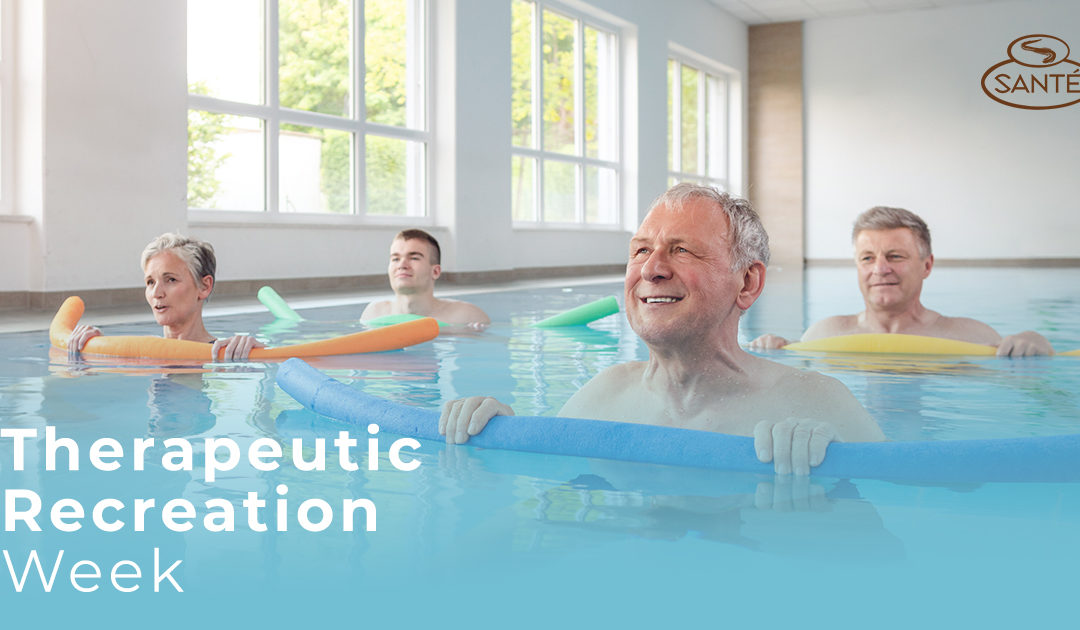
Recreational therapy and its role in physical and psychological healing
This week, Santé recognizes National Therapeutic Recreation Week, a time to raise awareness about therapeutic recreation programs that can help those with physical and psychological impairments.
At Santé communities, we are committed to offering our patients and residents a wide range of therapeutic recreation services. When combined with additional therapies as well as skilled nursing, these services help members of our community adapt to and overcome ongoing health concerns.
What Is Therapeutic Recreation?
Therapeutic recreation, also known as recreational therapy (RT), is an approach that uses leisure and other activity-based interventions to address the needs of those with illnesses, disabilities and chronic conditions. Administered by a Certified Therapeutic Recreation Specialist (CTRS), these activities are designed to maintain or improve physical, cognitive, social, and emotional function.
“With age comes the greater likelihood of degenerative conditions,” notes Bree Solomon, Santé’s lead CTRS. “For many, decreased physical and mental capacities lead to withdrawal from the activities that make life worth living. Because of this, a primary goal of our recreational therapy is to allow residents to participate fully in life.”
Who Might Benefit from Recreational Therapy?
Recreational therapy can help people of all ages. With regard to older adults, it’s particularly helpful with:
- Recovering from strokes
- Rehabilitating from a surgery, illness or injury
- Improving motor skills
- Independently carrying out activities of daily living
- Living with cancer treatment
- Experiencing anxiety in care settings
- Working through isolation
Difference Between Occupational Therapy and Recreational Therapy
Both recreational and occupational therapy help patients recover from injuries, regain physical function and reintegrate into daily life. However, recreational therapy (as the name implies) facilitates recovery through leisure activities.
For example, following a broken hand, an occupational therapist would likely work with a person to develop a set of exercises and strategies that allow them to regain manual dexterity. Conversely, a recreational therapist may assess the patient’s situation and conduct a number of seemingly ordinary activities – building birdhouses or yoga, for example – that help to restore motor function.
During therapeutic recreation, patients and therapists engage in structured activities that improve one’s ability to interact with their environment. Depending on a person’s condition, both occupational and recreational therapy can work in tandem as part of one’s greater care plan.
Benefits of Recreational Therapy
Recreational therapy aids in both psychological and physical recovery, resulting in improvements in a person’s overall well-being. Through participation in RT programming, patients might expect the following:
Reduced risk of depression
A majority of therapeutic recreation activities are geared toward getting patients up and moving. Whether through physical activities or creative tasks, participants can expect a greater degree of stimulation.
2019 research indicates that physical activity can help decrease symptoms of depression. Additionally, activities like music, art, and dance can all be said to have benefits with regard to staving off depression.
Lowered stress
For many, transition to a senior care community can be incredibly stressful. Recreational therapy can help mitigate some of this entailed stress. This can be particularly important for those making a permanent move to a skilled nursing facility.
Often administered in a group setting, therapeutic activities provide the fertile ground for building social bonds, both with other patients and staff members. This allows patients to feel a greater sense of comfort in their new home, whether it’s temporary or long-term.
Increased cognition
Studies show that therapeutic recreation can lead to increased cognitive function, particularly in those with dementia. A combination of exercise, social interaction, and brain-boosting games like chess or bridge can help the brain to maintain and improve its function.
Recovery of basic motor functioning
Therapeutic recreation often includes programs that get seniors up and active. Walks, sports, swimming, dancing, and tai chi – all movement-based – help to improve a patient’s balance, strength and flexibility. Improvements in these areas not only allow a person to keep moving, but they’ll also help prevent injuries in the future.
Boosted confidence and independence
For many, a major injury can dramatically impact one’s ability to perform activities of daily living. Getting dressed, bathing, or even eating can all be difficult in the wake of a stroke, fall or another injury. Recreational therapy can not only set a person on the path to recovery, but it can also provide them with the practice that gives them confidence in regaining autonomy in these areas.
Strengthened social connections
For older adults, social isolation can lead to a variety of negative health outcomes, including depression and dementia. The inherent social nature of many recreational therapy activities spurs the formation of new social bonds, counteracting feelings of social isolation.
One 2018 study published on the National Library of Medicine’s website finds that therapeutic recreation can drastically improve social interaction and prevent social isolation among seniors living in care communities.
Increase in self-esteem
As one might expect, therapeutic recreation often results in demonstrable improvements in a person’s self-esteem. A 2019 study published in the Journal of Gerontology finds that therapeutic recreation also improved the quality of life for seniors in an adult day center.
A key component of recreational therapy is the customization of activities. This allows recreational therapists to tailor programming to the interests of their patients. By providing them a structured environment in which to participate in sports, arts, or exercises that interest them, recreational therapists promote greater confidence.
Recreational Therapy Activities
Recreational therapy activities can span a wide range of hobbies, interests and skill levels. Regardless of the specific activity, the focus will always be on active participation, social interaction and physical stimulation.
With these tenants in mind, recreational therapists design an extensive curriculum of RT activities.
Arts and Crafts
For seniors who enjoy expressing themselves, therapeutic art activities provide an invaluable outlet. Even for those who don’t consider themselves artistic, painting, drawing, sculpting, and collaging can still have benefits.
Naturally, the goal of these activities is not to create a masterpiece but rather to stimulate activity, creative thought and discussion. In particular, painting portraits of loved ones can be a great way to generate conversation and memories.
Animal Interactions
While outright pet ownership often proves to be too much for seniors, animal interactions often have a positive therapeutic effect on residents of senior care communities. While there is much research to be done in these areas, interactions with dogs and cats have been shown to reduce anxiety, lower depression, increase physical activity and decrease loneliness.
Cooking
Something as simple as cooking is easy to overlook as a serious form of therapy; however, it’s often a great way to both engage seniors and learn more about their lives. Central to many memories, meal preparation also provides a great format for social interaction.
Hosting family meals, sharing recipes, and exchanging freshly made treats are all great ways to spur community engagement. Even if a person is physically unable to cook, they can certainly remember the taste of a favorite treat.
Puzzles and Brain Games
Sudoku, crossword puzzles, and other cognitive games are all great ways to keep the mind sharp. While research is still inconclusive in this area, many experts suspect that these types of brain teasers can help stave off cognitive decline. Additionally, when performed in a group setting – scavenger hunts, for example – they can provide the basis for encouraging teamwork and problem-solving.
Outdoor Activities
It’s widely thought that outdoor activity is essential for good health, and there is ample research to support this. Depending on where you live, the type of outdoor activities will vary, but you might consider swimming, hiking, and walks. Beyond simply being in the outdoors, physical activity, in general, can also lead to positive health outcomes.
Music and Dance
When it comes to reducing stress, there is hardly a better tool than music. For seniors, music stirs memories of the past and provides opportunities to connect with other residents. For those who are physically capable, dance also provides space to connect. In specific cases, more formal music therapy can also be helpful.
Recreational Therapy at Santé Communities
At Santé communities, we utilize an array of therapeutic approaches to meet the needs of our residents. In addition to speech, physical, and occupational therapies, recreational therapy also plays a key role in the health of the people we serve.
Led by a team of Certified Therapeutic Recreation Specialists, the RT programming in our communities promotes active participation in residents, leading to better physical and psychological well-being.



